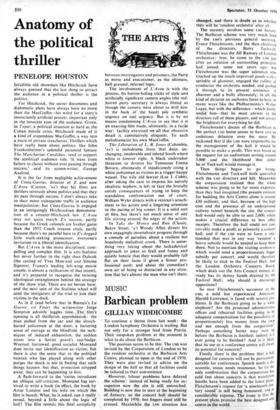Anatomy of the political thriller
PENELOPE HOUSTON
Infallible old showmen like Hitchcock have always guessed that the last thing to attract the audience in a political thriller is the politics.
For Hitchcock, the secret documents and diplomatic plans have always been no more than the MacGuffin—his word for a story's insouciantly artificial pretext, important only in the innocent eyes of the audience. Given, in Topaz, a political situation as hard as the Cuban missile crisis, Hitchcock made of it a kind of stupendous MacGuffin, a way into a maze of private treacheries. Thrillers which have really been about politics, like John Frankenheimer's splendid paranoid fantasy The Manchurian Candidate, tend to support the apolitical audience rule. It went from failure to classic without ever passing through success,' said its screen-writer, George Axelrod.
It is the far from negligible achievement of Costa-Gavras, director of Z and now L'Aveu (Curzon, 'AA') that his films are thrillers seriously about politics and that they do pass through success. I don't always take to their more transparent traffic in audience manipulation; but Costa-Gavras is engaged in an intriguingly Hitchcockian demonstra- tion of a counter-Hitchcock law. L'Aveu may not quite match Z's success, partly because the Greek colonels are livelier game than the 1952 Czech treason trials, partly because there's no parallel here to Z's dogged little truth-seeking prosecutor, everyone's invitation to a liberal identification.
But L'Aveu is the more disciplined, com- pelling and complex film. It is anti-Stalinist but never further to the right than Dubcek (the casting of Yves Montand and Simone Signoret, France's leading left-vying movie couple, is almost a ratification of that intent), and it's prepared to recognise the twisting ideological entanglement behind the strategy of the show trial. There are no heroes here; and the next spin of the Stalinist wheel will send the instigators of the trial to join their victims in the dock.
As in Z (and before that in Resnais's La Guerre est Finie) the scriptwriter Jorge Semprun adroitly juggles time. The, film's opening is all thrillerish apprehension: the man pulled from the car and the slouch- hatted policemen at the • door, a battering sense of outrage at the blindfold, the tech- niques of induced exhaustion, the sudden zoom into a Soviet guard's cap-badge. Worried, furrowed, good socialist Montand does invite our identification as victim; but there is also the sense that to the political veteran who has played along with other purges the shock is not in finding that such things happen, but that, protection stripped away, they can be happening to him.
A flash-forward to the 'sixties introduces an oblique self-criticism. Montand has sur- vived to write a book (in effect, the book by Artur London and his wife on which the film is based). What, he is asked, can it really reveal, beyond a little about the logic of hell? The film reveals this final complicity between interrogators and prisoners, the Party as nurse and executioner, as the ultimate, half-grasped, infernal logic.
The involvement of L'Aveu is with the process. Its button-holing tricks of style and artificially significant camera angles (the red- haired party secretary is always filmed as though the camera were about to drill him in the back of the head) pile synthetic urgency on real urgency. But it is by no means condemning L'Aveu to say that it is an exacting film made, ultimately, in a facile way: facility exercised on all that obsessive detail is cumulatively eloquent. To each melodramatist his own MacGuffin.
The. Liberation of L. B. Jones (Columbia, `AA') is melodrama from that deep, un- changing, intolerable and inbred South where white is forever right. A black undertaker threatens to divorce his Tennessee Emma Bovary, obstinately if injudiciously citing a white policeman as vicious as a trigger-happy weasel. The wily old lawyer (Lee J. Cobb), after taking the case to impress his naively idealistic nephew, is left to face the brutally untidy consequences of trying to keep the scandalous confrontation out of court. William Wyler directs with a veteran's attach- ment to his actors and a lingering attention to the pacing of big scenes.' It is a solid sort of film, but there's not much sense of any life stirring around the edges of the action.
In Take the Money and Run (Classic, Baker Street, 'A') Woody Allen directs his own engagingly invertebrate progress through a comedy of parodies, about a resilient but hopelessly maladroit crook. There is some- thing very taking about the lackadaisical approach to jokes so frail and funny and quietly lunatic that they would probably fall flat on their faces if given a firmer pro- fessional push; and about the -comedian's own air of being so distracted in any situa- tion that he's almost the man who isn't there.










































 Previous page
Previous page